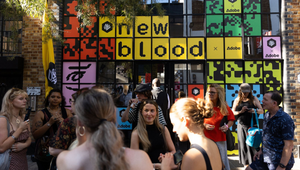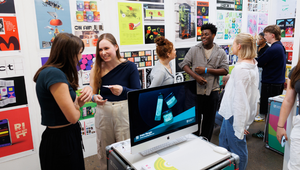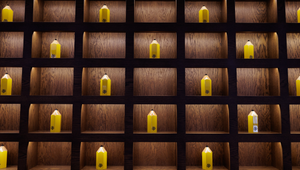
How D&AD New Blood is Slowly Shifting the Sands of the Creative Landscape

“New Blood is not a machine to feed design and advertising agencies. New Blood is challenge.
New Blood is an axe to frozen ways.
New Blood is people who think differently.
New Blood is rebalancing, readdressing, responding.
New Blood is about marking tomorrow as yours.
New Blood is a shock to the system.
We need New Blood.”
These are the words that greet you when you first walk into D&AD HQ in London. And they say a lot about the way the organisation views the future of creative talent - a future that the D&AD New Blood Shift programme is trying to influence. Emily Nelson, one of the graduates of the 2018 programme instantly felt a sense of recognition when she first saw them printed next to the entrance. “I remember reading them and thinking it sounds like me,” she says. “I’m quite tired of feeling like I have to contort myself into a specific image that fits what a creative should typically be. It’s nice to be able to come from my own background and experience and for that story to be OK. A lot of people won’t just accept me for who I am and what I’ve already done, rather than go to a traditional ad school and limit myself.”
Emily chose a different path into a creative career. Having dropped out of an anthropology degree, she taught herself photography and began making films. She’s spent the last four years working in communication before hearing about Shift through seeing a graduate from previous years post about it on Instagram.

D&AD New Blood Shift is a free 12-week night school that provides young people without qualifications a leg up into the creative industries. The programme receives immense industry support, with applicants in 2017 going on to placements and employment with companies including Nike, BBC Creative, Iris and AKQA.
Throughout the weeks, the ‘Shifters’ work on a diverse range of projects that reflect the latest trends and topics of the industry. And two weeks ago, D&AD was displaying all the work produced by the 2018 Shift Class at a one-day breakfast showcase, where I met some of the class.

As part of Shift, applicants get the opportunity to work on real client briefs set by leading creatives. The briefs for this year have been set by Formula E in partnership with Iris and by AKQA, who used their client Beats as the framework to build their brief.
David Osafo worked with Denisa Krasniqi and Emily on the brief for Beats that won their team the award for Most Innovative Approach. He’s a drop-out too. After deciding computer science wasn’t for him he worked in supermarkets while immersing himself in the visual arts in his spare time on photoshoots, filming, design, animation while he worked in a supermarket, before getting a job at at Sony Music as a creative designer.
“It’s a comfortable place for drop outs to come,” says Isabel Mickleburgh, who dropped out from a fashion design course but has kept up a passion for it. Her boyfriend told her about Shift, but they were having an argument at the time. “I told him to fuck off,” she says. As the deadline approached the idea that the course might be a good idea grew stronger for her. “It was the first time I was applying for something that didn’t ask for your CV or education, work experience. It was just what you do.” In a last minute change of heart, she called a friend to model for her and did a photoshoot, finishing her application half an hour before the deadline.
After the application process, those who made it through went on to a challenge day where they’d be working on live mini briefs, with the kind of creative heavyweights that D&AD has access to assessing them. “It was a very weird day. We all went in a bit blind,” says Isabel.
Chad Joyce wasn’t sure what to make of the day at first either: “Everybody was nervous because they didn’t know how far to push things. Then I dropped a bin down the stairs and realised we could do anything we wanted.” The organisers asked if he was OK, but he said he was just working on the brief - to describe the word ‘curiosity’. “It worked. Everyone turned their head to look,” says Chad, who would later go on to be on the Overall Winning team with Isabel and Christian Johnstone.

Emily felt at ease from day one. “It wasn’t that deep,” she says. “Because [the assessors were] creative they were really engaging and cool to talk to about our ideas. It didn’t feel like you were at school.”
David felt the same. “Even from the first day it was so easy going, welcoming. You’re comfortable as soon as you’re here.”

The next step was a three day crash course, again with various creatives plucked from the industry D&AD is so embedded in. Emily relished the access to these people. “Just being able to be candid with those people and ask what their biggest failure was, and get a real answer, was something we hadn’t seen before. It was really dope,” she says.
For the next few months the night school became a huge part of the Shifters lives as they spent their evenings listening to and working with industry guest speakers and applying what they’d learnt to real briefs.
The brief from Formula E and Iris read:
“We want progressive-minded 16-35-year-old sports enthusiasts to discover Formula E as the future of racing. By creating unmissable content, experiences or activations that bring to life ‘how we race’ in Formula E so that they talk about, share and get involved in the sport.”

AKQA used their client Beats for their brief, devising a brief that fit that brand:
“Beats are looking to new occasions to capture new consumers – like the commute.
More people are using public transport on their commutes, traveling further and for longer periods of time each day. Almost half of commuters across Europe listen to music so they can block out others, relax and make the journey more bearable.
“Make Beats the indisputable companion for commuters.
“Celebrate the power of music escapism on the commute. How it takes you out of your usual well-trodden path, crammed in with other strangers, to take you closer to the music, the memories, another place – just like the artist intended.”
The 19 Shifters worked in teams on these briefs from October to January, with regular check ins with the actual brand and agencies to make sure they were on the right track.
And two weeks ago at an evening reception hosted at the D&AD offices, work from the Shift graduates was exhibited to a host of leading industry figures, including the winning projects for the 2018 briefs, securing the winning Shifters chances of paid placements with the sponsor companies.

For David, the course is has been transformative. “This is kind of like university for me now,” he says. “I don’t know any other other place like this.” The fact that people without formal training like him can get a chance at breaking an industry that to many seems impenetrable, “I think that is priceless,” he says. “I think this has really emphasised what collaboration is, being able to see other people’s skills, read into them and see how you can make things work because you can’t do everything alone. Everyone on this course is so talented and the work everyone’s managed to create is there to show that.”
Raafaye Ali Sheikh, who was on the team that won Best Photography/Art Direction began on the course as an illustrator but has since learnt he wants to branch out in disciplines. “Shift was about trying to push the boundaries and see what other skill sets you can learn from it,” he reflects. “We can always apply elements of design to another medium. I think Shift really helped promote that and build confidence in yourself.”
He’s also taken personal solace in Shift. At the same time he was going through an employment tribunal representing himself. “It’s been a tough one,” he admits. “But you’ve got to throw yourself out there and this has been a lucky opportunity to push what I’m creatively able to do. It’s such a positive because that was bringing me down and this has uplifted me. To have people who really believe in your self development, seeking to make sure you have the opportunity to experience things you’d probably never be able to do if you didn’t go to university.”
Emily’s biggest takeaways has been learning the power of perseverance. She worked full time in her communications day job through the course. “It was a big sacrifice for me,” she says. “It was a journey in a lot of ways but it taught me that if you really are passionate about something it won’t feel like work. I’d go to work in the day, be really tired and come here and have fun. So that’s how you know this is what you should be doing. The most important thing for me is realising that that can be a reality.”
Learn about the whole class of 2018 here… And maybe even give them a job!















